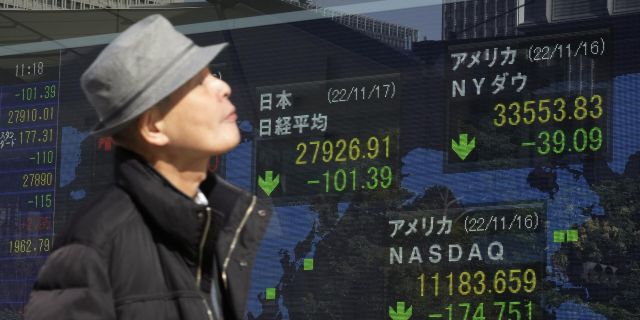Bloomberg: five scenarios of negative development of the world economy are namedIn 2023, investors intend to avoid risks that could plunge the global economy into chaos, Bloomberg writes.
The author of the article considers five scenarios, the implementation of which will have a negative impact on world markets.
Richard HendersonAfter this year, which turned out to be the worst in terms of global stocks in more than 10 years, and demonstrated an unprecedented collapse of bonds for the 21st century, many investors refuse to accept anything without proof.
While optimists are betting on a reversal of central banks in the direction of lowering interest rates, China is abandoning quarantine measures, and the conflict in Europe is weakening, others are everywhere looking for risks that could plunge markets into chaos again.
Below are five scenarios that threaten to bring investors even more problems in the coming year.
Stale inflation
“The bond market is waiting for a gradual normalization of inflation within 12 months,” said Matthew McLennan of FirstEagle Investment Management. But this could be a huge mistake. According to him, there is a real risk that wage growth and the pressure of the supply side in the form of an increase in the cost of energy carriers will continue to inflate consumer prices.
This will exclude the expected mid-year reversal of the Fed and the ECB in the direction of reduction. What's the result: stocks and bonds will continue to fall, the dollar will strengthen, and emerging markets will face new challenges. The question is how the recession provoked by higher borrowing costs will affect investors.
“The Fed did not foresee the approach of inflation, and in its desire to overcome it, it may not notice the impending financial catastrophe," McLennan said. "It is quite possible that the Fed simply underestimates this risk.”
Problems in China
Chinese stocks jumped by an average of 35% compared to the October low amid the prospect of a full recovery of the world's second largest economy from the effects of prolonged, severe quarantine measures.
Here, optimism is countered by the danger of overloading the healthcare system as the number of infected people increases and economic activity falls. In recent weeks, the alarm has been caused by hospitals clogged to the eyeballs, queues at funeral homes and a decrease in social mobility in megacities.
“The infection curve will creep up and peak 1-2 months after the Chinese New Year,” said Marcella Chow, global markets strategist at JPMorgan Chase. She expects success from reopening the borders, but warns of the risks associated with the development of coronavirus.
The recovery of Chinese stocks remains fragile, and any prospect of a slowdown in economic activity will undermine demand in commodity markets. This will especially affect industrial metals and iron ore.
Russian-Ukrainian conflict
“If the situation escalates, NATO will intervene more actively, and sanctions will tighten, this will have extremely negative consequences,” said John Vail, chief global strategist at NikkoAsset Management.
According to him, at this dangerous moment for the world economy, secondary sanctions against Russia's trading partners, in particular India and China, will strengthen the effect of the current restrictions. “This is fraught with a serious crisis in the supply of goods such as food, energy, fertilizers, some metals and chemicals,” the expert said.
An even more alarming scenario will be the use of tactical nuclear weapons by Russia — the risk, although it seems remote, does not go beyond the probable. The Ukrainian export of agricultural products will come to an end immediately.
The downturn in emerging markets
Many investors expect a weakening of the dollar and lower energy prices in 2023, considering these two factors capable of easing pressure on emerging markets.
From the point of view of the currency markets, any oversight in attempts to curb inflation can negate the result, while an increase in the intensity of hostilities in Ukraine is only one of many risks that could cause a jump in energy prices again.
“It may well turn out that the difficulties in emerging markets will last for another year," said Shane Oliver, head of investment strategy and economics at AMP Services Ltd. "A high or rising US dollar will work against emerging market countries, because many of them have debt denominated in this currency.”
The consequences of such a scenario will be felt especially acutely by the Governments of developing countries, which will have to shoulder an even heavier burden of debt.
The return of the coronavirus
The emergence of a more contagious and deadly COVID-19 strain, or even the long-term presence of existing ones, can disrupt supply chains again, causing inflation and slowing economic activity.
“We believe that the macroeconomic blow to growth will be felt primarily by large economies and those who rely more on trade than others,” said Ms. Chow of JPMorgan.
Now she believes that the virus will continue to recede, and the negative in the markets will depend mainly on the calculations of investors against the background of the recession in the United States and Europe.

